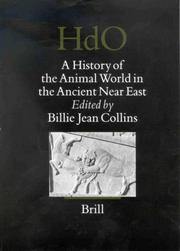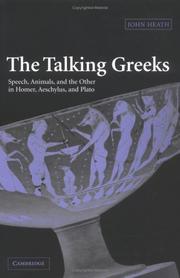| Listing 1 - 3 of 3 |
Sort by
|

ISSN: 01699423 01699423 ISBN: 9004121269 9786610464746 141759084X 1280464747 9047400917 9781417590841 9789047400912 9789004121263 Year: 2002 Volume: 64 Publisher: Leiden ; Boston : Brill,
Abstract | Keywords | Export | Availability | Bookmark
 Loading...
Loading...Choose an application
- Reference Manager
- EndNote
- RefWorks (Direct export to RefWorks)
This book is about all aspects of man’s contact with the animal world; sacrifice, sacred animals, diet, domestication, in short, from the sublime to the mundane. Chapters on art, literature, religion and animal husbandry provide the reader with a complete picture of the complex relationships between the peoples of the Ancient Near East and (their) animals. A reference guide and key to the menagerie of the Ancient Near East, with ample original illustrations.
Human-animal relationships --- Animals in art --- Animals in literature --- Animals --- Religious aspects --- Animals in art. --- Animals in literature. --- Religious aspects. --- 59 <33> --- -Animals in art --- -Animal painting and illustration --- Pets in art --- Wild animals in art --- Zoo animals in art --- Animal-human relationships --- Animal-man relationships --- Animals and humans --- Human beings and animals --- Man-animal relationships --- Relationships, Human-animal --- Animal kingdom --- Beasts --- Fauna --- Native animals --- Native fauna --- Wild animals --- Wildlife --- Organisms --- Zoology --- Zoologie. Dierkunde--Oud-Palestina. Judea --- Relations homme-animal --- Animaux dans l'art --- Animaux dans la littérature --- Animaux --- Aspect religieux --- Animal painting and illustration --- Human-animal relationships - Middle East --- Animals - Religious aspects

ISBN: 2858161941 281070838X 9782858161942 Year: 2019 Volume: *1 Publisher: Toulouse : Presses universitaires du Midi,
Abstract | Keywords | Export | Availability | Bookmark
 Loading...
Loading...Choose an application
- Reference Manager
- EndNote
- RefWorks (Direct export to RefWorks)
Entre le ve et xie siècle, la vision du monde animal que donne la littérature occidentale est la résultante de bien des héritages : gréco-romain, judéo-chrétien, mais aussi celtique ou germanique... Jacques Voisenet en détermine ici la nature et le poids. Il montre aussi que le bestiaire du Haut Moyen Âge n'est pas dénué d'une certaine nouveauté : les clercs ont su adapter les acquis du passé au système symbolique du christianisme et faire de la faune un véritable instrument au service de la foi.
Christian religion --- Art --- Semiotics --- anno 500-1199 --- Animals in literature --- Animals in poetry --- Animaux dans la littérature --- Animaux dans la poésie --- Beast epic --- Beestenboeken --- Bestiaires --- Bestiaria --- Bestiaries --- Dieren in de literatuur --- Dieren in de poëzie --- Dierenepiek --- Dierenepos --- Dierenfabels --- Dierenromans --- Dierensprookjes --- Dierenverhalen --- Epopées animales --- Fables ésopiques --- Animals --- Christian art and symbolism in literature --- Literature, Medieval --- Animaux --- Art et symbolisme chrétiens dans la littérature --- Littérature médiévale --- Folklore --- Religious aspects --- Christianity --- History and criticism --- Aspect religieux --- Christianisme --- Histoire et critique --- -Animals --- -Animals in literature --- -European literature --- Medieval literature --- Illustrated books --- Animal kingdom --- Beasts --- Fauna --- Native animals --- Native fauna --- Wild animals --- Wildlife --- Organisms --- Human-animal relationships --- Zoology --- -Christianity --- -Folklore --- Animaux dans la littérature --- Art et symbolisme chrétiens dans la littérature --- Littérature médiévale --- Animal lore --- Animals, Legends and stories of --- Ethnozoology --- Religious aspects&delete& --- Christianity. --- Animals in literature. --- Bestiaries. --- History and criticism. --- Folklore. --- Literature, Medieval - History and criticism --- Animals - Folklore --- Animals - Religious aspects - Christianity --- Haut Moyen Âge --- littérature --- christianisme --- bestiaire

ISBN: 0521832640 9780521832649 9780511483011 9780521117784 0511111134 9780511111136 0511111460 9780511111464 0511483015 1280415584 9781280415586 052111778X 1107139309 9781107139305 0511181329 9780511181320 0511197950 9780511197956 0511299060 9780511299063 Year: 2005 Publisher: Cambridge : Cambridge University Press,
Abstract | Keywords | Export | Availability | Bookmark
 Loading...
Loading...Choose an application
- Reference Manager
- EndNote
- RefWorks (Direct export to RefWorks)
When considering the question of what makes us human, the ancient Greeks provided numerous suggestions. This book argues that the defining criterion in the Hellenic world, however, was the most obvious one: speech. It explores how it was the capacity for authoritative speech which was held to separate humans from other animals, gods from humans, men from women, Greeks from non-Greeks, citizens from slaves, and the mundane from the heroic. John Heath illustrates how Homer's epics trace the development of immature young men into adults managing speech in entirely human ways and how in Aeschylus' Oresteia only human speech can disentangle man, beast, and god. Plato's Dialogues are shown to reveal the consequences of Socratically imposed silence. With its examination of the Greek focus on speech, animalization, and status, this book offers new readings of key texts and provides significant insights into the Greek approach to understanding our world.
Animals in literature --- Animals in poetry --- Animaux dans la littérature --- Animaux dans la poésie --- Beast epic --- Dieren in de literatuur --- Dieren in de poëzie --- Dierenepiek --- Dierenepos --- Dierenfabels --- Dierenromans --- Dierensprookjes --- Dierenverhalen --- Dieux grecs dans la littérature --- Difference (Psychology) in literature --- Differentie (Psychologie) in de literatuur --- Différence (Psychologie) dans la littérature --- Epopées animales --- Etres humains dans la littérature --- Fables ésopiques --- Goden [Griekse ] in de literatuur --- Gods [Greek ] in literature --- Human beings in literature --- Human-animal relationships in literature --- Language and languages in literature --- Langue et langues dans la littérature --- Man-animal relationship in literature --- Mens-dier relaties in de literatuur --- Mensen in de literatuur --- Parole (Linguistique) dans la littérature --- Relations homme-animal dans la litérature --- Speech in literature --- Spraak in de literatuur --- Taal en talen in de literatuur --- Greek literature --- Speech in literature. --- Human-animal relationships in literature. --- Difference (Psychology) in literature. --- Language and languages in literature. --- Gods, Greek, in literature. --- Human beings in literature. --- Animals in literature. --- Littérature grecque --- Parole dans la littérature --- Relations homme-animal dans la littérature --- Psychologie différentielle dans la littérature --- Langage et langues dans la littérature --- Homme dans la littérature --- History and criticism. --- Histoire et critique --- Aeschylus --- Homer --- Plato --- Littérature grecque --- Parole dans la littérature --- Relations homme-animal dans la littérature --- Psychologie différentielle dans la littérature --- Langage et langues dans la littérature --- Dieux grecs dans la littérature --- Homme dans la littérature --- Animaux dans la littérature --- Plato. --- Gods, Greek, in literature --- Man in literature --- History and criticism --- Aflāṭūn --- Aplaton --- Bolatu --- Platon, --- Platonas --- Platone --- Po-la-tʻu --- Pʻŭllatʻo --- Pʻŭllatʻon --- Pʻuratʻon --- Πλάτων --- אפלטון --- פלאטא --- פלאטאן --- פלאטו --- أفلاطون --- 柏拉圖 --- 플라톤 --- Homeros --- Homère --- Aischylos --- Eschilo --- Eschyle --- Eschylus --- Criticism and interpretation. --- Homerus --- Platon --- Platoon --- Criticism and interpretation --- Hóiméar --- Hūmīrūs --- Gomer --- Omir --- Omer --- Omero --- Ho-ma --- Homa --- Homérosz --- האמער --- הומירוס --- הומר --- הומרוס --- هومر --- هوميروس --- 荷马 --- Ὅμηρος --- Гамэр --- Hamėr --- Омир --- Homero --- 호메로스 --- Homerosŭ --- Homērs --- Homeras --- Хомер --- ホメーロス --- ホメロス --- Гомер --- Homeri --- Hema --- Pseudo-Homer --- Pseudo Omero --- Homer. --- Aeschylus. --- Платон --- プラトン --- Eskhil --- Esquilo --- Aiskhilos --- Eshil --- Æskílos --- Ajschylos --- Eschil --- Esḳilos --- Äschylos --- Eskili --- Aiszkhülosz --- Eschylos --- Iskilos --- Эсхил --- אייסכילוס --- איסכילאס --- איסכילוס --- إيسخولوس --- ايسخيلوس --- Αἰσχύλος --- Arts and Humanities --- History
| Listing 1 - 3 of 3 |
Sort by
|

 Search
Search Feedback
Feedback About
About Help
Help News
News